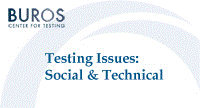Buros-Nebraska Series on Measurement and Testing

Social and Technical Issues in Testing: Implications for Test Construction and Usage
Date of this Version
1984
Document Type
Article
Citation
Published in Social and Technical Issues in Testing: Implications for Test Construction and Usage, edited by Barbara S. Plake (Hillsdale, NJ: Lawrence Erlbaum Associates, 1984).
Abstract
The field of measurement can be conceptualized as having three different but interrelated aspects. First of all, it is a science or a body of knowledge concerned with the development of theory and methodology and with the identification and confirmation of generalizations governing interrelationships among variables appropriate to its content. Measurement theory and its application to measurement problems are important contributors here. Second, it is an applied science or technology concerned with the development of products that represent a useful application of such a science or body of knowledge. For the field of measurement, test development and validation are important exemplars. Third, it is a body of information concerned with why, when, and how these products are used, and the results of such use, in the practical measurement setting for which they were typically intended. This sequence of interrelated aspects of measurement, from knowledge to implementation to use, is the conceptual foundation for much of what follows.
Within such a context as that just described, the Buros Institute of Mental Measurements has always played a unique role. The science of measurement or measurement theory has not been one of the Institute's chief concerns, although the Institute is often an indirect beneficiary of such contributions. However, the Institute has had major involvement with the evaluation of test products, the products of an applied science, and with the education of test users in the more effective selection and use of those products. Because of the nature of this involvement, the Institute has had a perspective on the three separate aspects of the field of measurement that is not typical of those representing only the singular aspects of the continuum. It is this unique perspective of the Institute that will serve as the distinguishing feature of the discussion to follow.
The purpose of this discussion is to evaluate critically the contributions and progress made in these separate, but interrelated, aspects of measurement: knowledge, implementation, and use. The theme of this discussion is that the greatest progress has been made in our knowledge, lesser progress in implementation, and the very least progress in selection and effective use. The implication of the discussion is that there is a pressing need to redress the imbalance that has developed.


Comments
Copyright © 1984 by Lawrence Erlbaum Associates. Digital edition copyright © 2012 Buros Center for Testing. This book may be downloaded, saved, and printed by an individual for their own use. No part of this book may be re-published, re-posted, or redistributed without written permission of the holder of copyright.